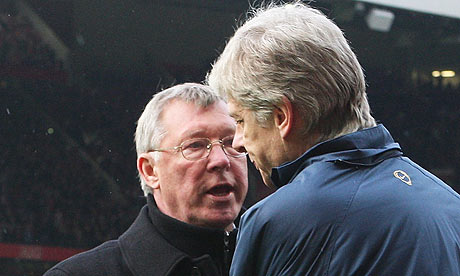Rivalry between Wenger and Ferguson unmatched in Sports
-

Sir Alex Ferguson and Arsène Wenger have enjoyed a more harmonious relationship in recent years. Photograph: John Peters/Getty Images.
From the shipyards of Govan and a bar-restaurant in Alsace came the two romantics who have done most in modern times to imbue English football with artistry.
If the world's favourite game is pretty much one long episode of Wacky Races, Sir Alex Ferguson and Arsène Wenger have been wheel to wheel since the last century, or September 1996, when Professor Pat Pending, as he would most likely be, entered Highbury's marble halls to declare war on the prosaic 1-0 win. For 14 years, hard Scot and visionary Frenchman have raced one another demonically, dropping out of the frame only briefly to allow Dick Dastardly (José Mourinho) to seize a pair of Premier League medals.
Ferguson served up Eric Cantona, Ryan Giggs, Cristiano Ronaldo and Wayne Rooney, and Wenger has offered us Thierry Henry, Cesc Fábregas and Robert Pires. Each manager has bestowed gifts on the English game that far transcend the tribal loathing that will splash across this afternoon's confrontation in north London. Neither chieftain will kick a ball as the teams grapple for vital psychological points but the match will be an expression of the characters of the two managers just as it always was.
This eternal conflict is in a class apart. Almost without respite the pair have fought over the high ground of expressive winning football. Ferguson went off to deal with Chelski for a while and Wenger busied himself rebuilding the London Colney kindergarten after the Invincibles had been reacquainted with defeat (and the pizza had flown) at Old Trafford in October 2004.
Today's convergence comes as Wenger's House of Promise might finally churn out the goods and United ride high in the title race despite five league defeats in 23 outings and a dip on their flamboyance chart. In Wednesday's Carling Cup semi-final second-leg, there was an early sense that the victors would be the side with the greater appetite and conviction. Manchester City may have that one day but it takes years to acquire. Fighting spirit has always competed with creativity to determine who goes home with the points when Arsenal and United clash.
Only when you really study the Ferguson-Wenger years do you realise how big a part they have played in our sporting lives. There may be nothing to match it in any major team sport across the world. When one looks for equivalents in post-war English football, Bill Shankly versus Matt Busby and Brian Clough against Don Revie drift back on the wind. But they fall far short.
The Busby-Shankly overlap spanned 12 years if you include the season Wilf McGuinness took charge before Busby returned, briefly, from upstairs. From 1959-71 Shankly won two league championships while Busby grabbed a couple to go with his 1968 European Cup.
The Clough-Revie duet was short and toxic. Revie was in charge at Leeds from 1961-74 but collided with Clough properly only when his successor at Elland Road was at Derby County from 1967-73. They won a title each in that period. It was Clough's hatred of Leeds and the 44 days he burned trying to eradicate their culture that turned his rivalry with Revie into such a rich seam of writerly material. Clough won his two European Cups with Nottingham Forest when "uncle" Bob Paisley was in charge at Liverpool and that, too, deserves a mention. Revie had his own skirmishes with Busby and Shankly in the 1960s.
But now consider the Ferguson‑Wenger narrative. In their 14 years Wenger has scored three Premier League titles and four FA Cups. Ferguson has amassed eight domestic championships, two FA Cups and two Champions League garlands. Their ambitions have played out continuously on the grandest stage conducted for club football: the Champions League, which has added a dimension denied to earlier generations, however piquant the old European Cup.
Today's Arsenal-United games lack the incendiary macho drama of the Roy Keane-Patrick Vieira era. From mutual disdain Ferguson and Wenger have evolved to respectful tolerance. The realisation that there was more to unite than divide them set in when Roman Abramovich came down in his helicopter to buy Chelsea.
The two have also seen from north and south the slow death of the autocratic manager. They have watched power shift to speculators and know-nothing owners who consider it business suicide to abdicate full control over a corporation to a guy in a tracksuit, however good.
Ferguson and Wenger are the last two untouchables in top football management. Through their wisdom and success they have saved their trade from being fully downgraded to the status of departmental head (man in charge of stuff that happens on the pitch).
They know they need each other to uphold the autonomy of the choreographer. When they're finally pulled apart, a huge light will go out.